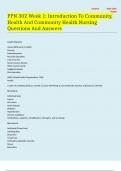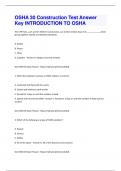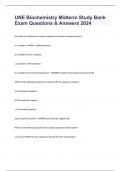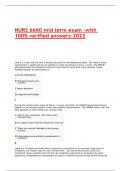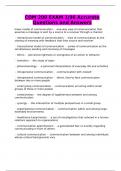Solution 2024/2025
Pepper
PPN 302 Week 1: Introduction To Community,
Health And Community Health Nursing
Questions And Answers
Health Disparity
means difference in health
Poverty,
Unemployment,
Poor/No Education,
Lack of access,
Social trauma, Racism,
Work environments,
Neighbourhoods,
Discrimination
WHO (World Health Organization) 1948
Health
a state of complete physical, mental, & social well-being & not merely the absence of disease or infirmity
Biomedical
Individual level
Cancer
HIV status
Heart disease
Diabetes
Hypertension
Chronic conditions
medications, surgeries, rehabilitation, therapies, and screening.
Behavioural
Individual/Group level
Smoking/diet,
Drug Use/
Unsafe sex,
Unhealthy eating/No exercise,
Stress
Education,
, Solution 2024/2025
Pepper
educational resources,
social marketing, public policies that support lifestyle changes
Socio-environmental
Community/society level
Stressful environments
Poverty
Lack of education/self-esteem, trauma experiences
Lack of safety,
Unemployment
Social injustice/racial injustice,
Social isolation
political and economic policies development, on social and welfare state development, advocacy, resource access, skill
building and empowerment
Harm Reduction
Individual level
Using unclean needles,
Using too much drugs,
Smoking too much,
Not using condoms
Providing Methadone,
Providing clean needles,
Smoking reduction,
Condom distribution
Health equity
means fair distribution of resources and opportunities not equal distribution of resources and opportunities
Resources and opportunities not hindered by race, poverty/social class, gender,
Use a critical theory lens
Recognizes that:
Social, economic and political conditions have a history
Scientific and practical ways of thinking and getting things done are open to systematic questioning and criticism
Critical social theories help us:
Unpack the 'taken for granted'
Look at power relationships and relations and the ways in which these are influenced by history, economics, politics,
social structures
Question the status quo
Micro level perspective
Individual, family and/or neighbourhood contexts

